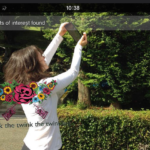Feminism in Augmented Reality, Videogames and Electronic Literature
Thursday, 5 January, 5:15–6:30 p.m., 401-403, Philadelphia Marriott
#s151 #MLA17

KI Berens, Caitlin Fisher, Jessica Pressman. Not pictured: Anastasia Salter. Photo by Leonardo Flores.
Speakers: Profs. Jessica Pressman, Kathi Inman Berens, Anastasia Salter
Respondent: Prof. Caitlin Fisher
Our panel presents research about the role of feminism in contested borders of printed books, electronic literature and videogames. We will keep to strict time allotments to permit a robust and vigorous QA.
JESSICA PRESSMAN
San Diego State University
Oculus Rift virtual reality headgear is usually donned to kill dragons or multitudes of soldiers, to explore far off places and feel superhuman. But Pressman argues that the VR and augment reality [AR} work of Canadian digital artist Caitlin Fisher confronts expectations about digital media, games, and electronic literature by employing such technology to tell women’s stories and to pursue feminist storytelling. Pressman examines how Fisher’s AR work Circle (2012) embeds multimodal vignettes about three generations of women onto little domestic objects, which Pressman designates “feminism in action,” specifically in the aesthetic enactment of its female-centered subject matter and its formal glitch aesthetics. More specifically, Pressman aims to show how Circle performs the central concerns of Material Feminism: an investment in illuminating how materiality and context-based relationality are central elements of experience and meaning-making. This short work about women and things insists on the relationality of animate and inanimate objects and, in so doing, it provides an opportunity to critique such philosophical movements as Object-Oriented Ontology. Moreover, the ways in which Circle achieves this critique promotes investigation into the larger and more central intersections between the technologies of AR, VR and feminism.

Me reading an AR poem, and being read as an object AR poetry is projected onto. Photo by Jeremy Douglass.
KATHI INMAN BERENS
Portland State University
“Moveable books” predate the printing press. Such experiments, including popular pop-up books of the nineteenth century, pushed against the boundaries of two-dimensional storytelling by crafting ways paper can mechanically foster motion and depth. iPad artists and game designers experiment with device-specific expressive capacities. I call moveable books designed for iPad “playable books” to invoke their ergodic filiation with videogames. In this presentation, I analyze one playable book, 80 Days (2014) by Inkle Studios, which won Time Magazine’s best game of the year and was named by The Telegraph a best novel of the year. Crossing the “border” between literature and videogames, 80 Days invites us to consider how popular modes of human/computer interaction in games shape new forms of reading in device-specific ways. I discuss how 80 Days’ gameful attributes adapt and contest Jules Verne’s 1873 novella Around the World in Eighty Days. The game gives the reader a physical experience of the original story’s chief mechanic, racing to beat the clock. Interactions with NPCs [non-player characters] in 80 Days unlock information essential to win; respect and cultural sensitivity are procedurally rewarded. This resists the original novella’s racist depiction of nonwhite “others.” My paper suggests how 80 Days‘ emergent game attributes interrupt our readerly drive to “master” a text.
ANASTASIA SALTER
University of Central Florida
Electronic literature exists at the intersection of the humanities, arts, and STEM: an acronym that itself defines a contested battleground of technical skills. The lack of diversity in STEM has received considerable scrutiny, and computer-related fields particularly suffer from a lack of diversity. Salter notes that this has contributed to the rise of “brogrammer” culture in disciplines with strong computer science components, and with it a rhetorical collision of programming and hypermasculine machismo. Brogrammer culture is self-replicating: in technical disciplines, the association of code with masculinity and men’s only spaces plays a pivotal role in reinforcing the status quo. Given this dramatic under-representation of women in computer science disciplines, the privileging of code-driven and procedural works within the discourse of electronic literature is inherently gendered. The emergence of platforms friendly to non-coders (such as Twine) broadens participation in electronic literature and gaming space, but often such works are treated and labeled differently (and less favorably) from code-driven and procedural works that occupy the same space. Salter argues that electronic literature communities must be aware of the gendered rhetoric and socialization surrounding code, and be vigilant against the tendency to value code (and, by extension, male-coded labor) over content when evaluating works in this form.
CAITLIN FISHER, Respondent
York University
Dr. Caitlin Fisher, co-founder of York University’s Future Cinema Lab and founder and Director of its Augmented Reality Lab, will respond to the papers as both scholar and artist. Since Pressman is analyzing one of Fisher’s AR works, the intersection between critical making and scholarship will be a key vantage in Fisher’s response. She will also facilitate questions from the audience.




